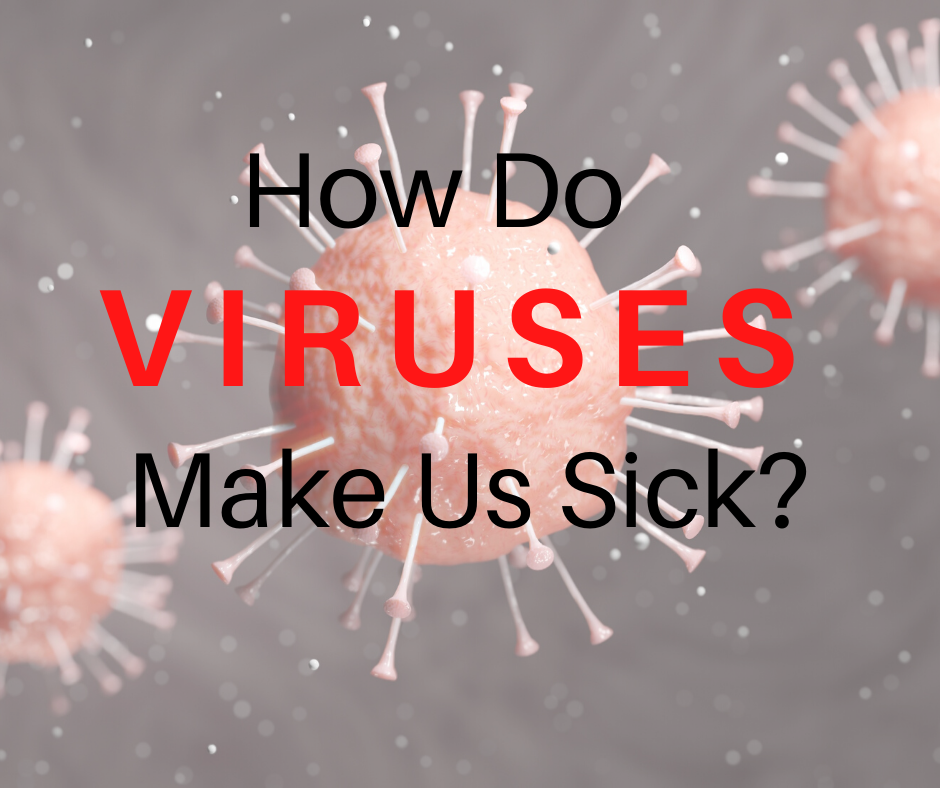
Why Do Viruses Make Us Sick?
It surprises many of my students when I tell them that viruses aren’t living. They always follow this epiphany with the question, then how do viruses make us sick?
Bacteria vs Virus
Unlike bacteria, viruses cannot make you sick without getting into the cells of your body. Since bacteria are living, they can sustain themselves, reproduce, and make you sick with or without getting into your cells. Viruses need your cells to make more of themselves, and this is what makes us sick.
Viral Takeover
When the viruses get into the cells of the body, they take over the normal workings and us it to make more viruses. When the virus uses the cells, it deprives them of the critical functions needed to survive. Viruses can be replicated many thousands of times within one cell and then released out of the cell to repeat the process over again in new cells.
Latency
Some viruses remain latent; viruses can hide out in cells and only occasionally uses them to replicate. An example of this is the herpesvirus (specifically, varicella-zoster virus) that causes chickenpox in children and shingles in adults. When infected with the virus as children, the virus never goes away, hiding out in the nerve cells around the spinal cord called ganglia. Later in life, due to stress and an aging immune system, the virus can reemerge, causing the shingles disease.
Other viruses like rhinoviruses, coronaviruses, and influenza viruses cause immediate disease. These viruses get into the cells, replicate, and breakout without latency (no hiding out!).
Cell Specific
Viral infections can be mild or acute. How sick we get depends upon the virus type, where it infects, and our immune response to the virus. Every kind of virus has a limited ability to gain access to specific cells of the body. That’s why cold viruses only infect the cells of the respiratory tract while other viruses, like the ebola virus, can infect immune and organ cells. Disease and the specific symptoms are a result of the damage done to cells by the virus.
Immune Response
Immune response to viral infections is another reason why we get sick. The immune system mounts a response to viruses that include molecules (like antibody) that target the viruses when they are outside of the cell and immune cells capable of killing the virally infected cells. Both types of actions require inflammation reactions that lead to the release of chemicals that make us feel poorly (e.g., fever, aches, chills, etc.).
Symptoms result from a combination of the damage done by the virus and the immune response to the virus. The more damage the virus does, the stronger the immune system responds. Most viruses can trick the immune system. There are many strategies that viruses have evolved to evade detection or elimination by the immune system. These strategies can prolong the duration of the disease, or it may be the reason why the immune system can never get the virus under control, and people die. Examples of this include the Ebola virus, where too much damage happens too quickly for the body to recover, and HIV that eliminates immune cells that protect the body, leaving it vulnerable to other diseases (other infections, cancer).
The Good News
The good news about viruses is that they can’t make us sick unless they get access to the cells they can infect. Getting a flu virus on your hands won’t make your hands sick! And the flu virus on your hands can only make you sick if you introduce the virus into your mouth, nose or eyes where it can then again access to the cells of the nose and throat that it can infect. See the reason why you should wash your hands and not touch your face during the flu season?!
Until next time, stay well!
Dr. Tobi Schmidt
